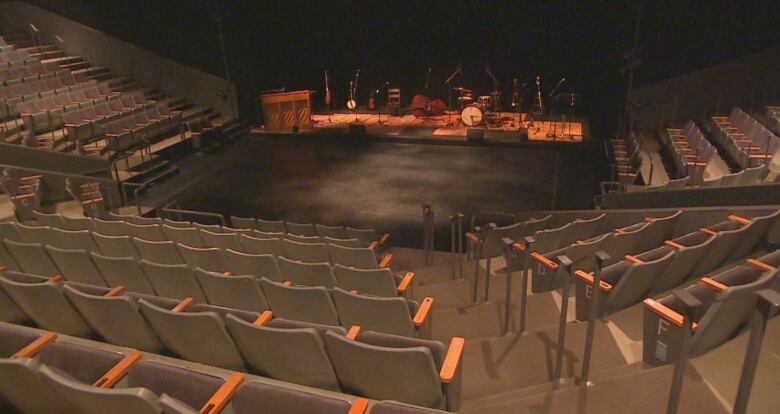Struggling Manitoba hotel industry pleads for tax relief from province
'They've weathered many storms but not a storm like this, and they really need some relief'

Hotel owners in Manitoba are on edgeas heightened pandemic restrictions comeintoforce in Winnipeg and the surrounding area on Monday and say they need government help to get through this.
"It's like my worst nightmare ever. The impact is just, I can't paint a more gloomy picture," said Manitoba Hotel Association president and CEO Scott Jocelyn.
"It's been a really tough seven or eight months dealing with all of this, and today we'll see more challenges for our people. People are on edge. They're very frustrated and really, really struggling."
Starting Monday, stand-alone nightclubs, bars and beverage rooms (which are attached to hotels) must close, along with casinos, entertainment facilities with live entertainment, video lottery lounges and bingo halls.
Businesses licensed asrestaurants and lounges can stay openbut are limited to 50 per cent capacity and can only seat up to five people at a table.
The restrictions will stay in place at least two weeks and come as the Winnipeg region battles the worst surge of COVID-19 cases Manitoba has seen since the pandemic began.
Jocelyn said theprovincial government has tried hard to balancethe economy and the public's safety through all of the measures it has instituted since March, "but the reality is, the protocols they're putting upon us are having a huge impact on what we do.
"If people can't travel into the city or the province, then we can't put people in our rooms, we can't hold events, we can't have people congregating in our bars, in our restaurants. Everything we do is being impacted."
Several broad assistance programs for business and individuals have been introduced by the province, but Jocelyn said thehotel association is hoping for specific relief.
Other provinces have better supported their hotel industry, he said.
"That's one of the frustrations. Some of the things that have happened in other provinces those provinces have handled them with some sector-specific relief, and the biggest one for us is paying the tax bill," Jocelyn said.
A hotel's taxes are based on revenues, but from two years ago, he explained.
"There isn't a hotel in Manitoba that's doing what they were doing two years ago [in terms of revenues due to COVID-19]. So how do you pay that bill?" Jocelyn said.
"They've weathered many storms but not a storm like this, and they really need some relief so they can continue to do all the great things that we do. We work hard for the province, we collect lots of taxes for the province in good times, and we need some help today."
Jocelyn doesn't believe the government knows how wounded the industry is, so his organization isjust wrapping up a full economic impact study by accounting firm Meyers Norris Penny.
"We really need some numbers that we can put in front of them to paint that picture. I'm anxiously awaiting that report," he said. He expects it will be released around the second week of November.
While some hotels in the province benefited from Manitobanstaking stay-cations this year and exploring more of their own province, it's not enough to turn the year around, Jocelyn said.
Some of the biggest hotels in Winnipeg have had single-digit occupancy rates after being closed for a few months due to COVID-19, he said.
"The stay-cation model, that's not going to work for them."
It's difficult to remain viable when you're only filling two out of every 10 rooms, agreedWinnipeg Chamber of Commerce President and CEO Loren Remillard, who echoedJocelyn's call for help.
"We need to have measures in place so we can ensure when we do get through this, we have a business community to return to, we have a restaurant sector, we have viable hotels and an arts and culture community that's still vibrant."
While there have beenhardships across-the-board in the business community since the onset of the pandemic, those sectors have beendisproportionatelydamaged, Remillard said. When the economy reopened in phases through late spring and early summer, theydid not see a significant bounce back.

The restrictions that kicked inMondaywill exacerbatean already-precarious situation,he said.
The business community fully understands the need, around public health,to implement those conditions, but it is "frustrating"to not see a corresponding level of relief measures in Manitoba for those hard-hit industries, he said.
For perspective, the Quebec government set aside$100 million to help businesses cover 80 per cent of fixed expenses such as rent and electricity for shuttered bars and restaurants, Remillard noted, adding that Saskatchewan's government hasspecific funding streams for hotels, hospitality and the event industry.

On Friday, when the latest restrictions were revealed, Manitoba Health Minister Cameron Friesen said it's too early to talk about providing financial assistance to businesses impacted by the measures.
Remillard strongly disagrees.
"We needed to be talking about this months ago. There is no too soon," he said. "Two weeks is a lifetime for a business that's holding on on a day-to-day basis.
"We need government to be a partner with the business community, to say 'we recognize the difficulty you're in and that it's made worse by these necessary public health measures. We're here to work with you to find solutions to ensure that you remain viable.'"
With files from Holly Caruk and Pat Kaniuga












_(720p).jpg)


 OFFICIAL HD MUSIC VIDEO.jpg)
.jpg)



























































































